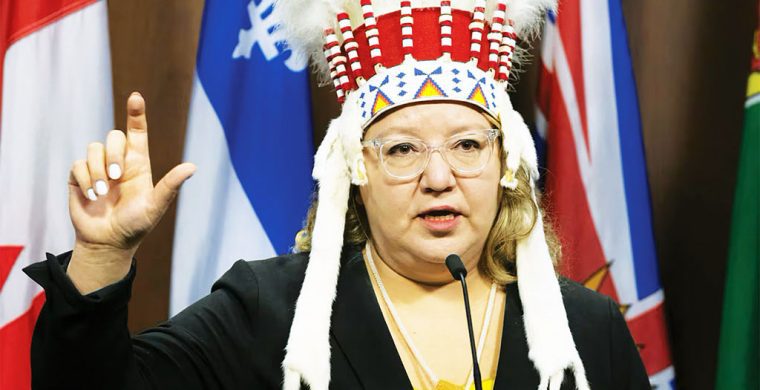Justin Trudeau…stop the tears…call an inquiry
Indigenous women, mothers, stood in front of Prime Minister Justin Trudeau during the Assembly of First Nations Special Chiefs Assembly in Ottawa last week. They took a deep breath, and they tried, often stopping to wipe away tears, to tell, not just their story but the story no parent ever wants to tell, the death of their child. They told Prime Minister Justin Trudeau their children died in interactions with police. Edith Wells told Prime Minister Trudeau her son died after being tackled, punched and tasered by police at a Calgary hotel. She told everyone within hearing distance, “They murdered my boy, they killed my son,” as she broke down in tears and was helped from the room. AFN chiefs passed a resolution during last week’s conference calling for an inquiry...
Weekly Cartoon
...
First Nations want in on Arctic Sovereignty talks
AFN National Chief Cindy Woodhouse Nepinak, Regional Chief Kluane Adamek, and Dene National Chief and Regional Chief George Mackenzie Call on Prime Minister Justin Trudeau to Include First Nations in National Dialogues on Arctic Sovereignty -First Nations leaders are calling on Canada to include them Canada’s Arctic Foreign Policy document. The Arctic Foreign Policydocument was updated recently to include additional points on Indigenous sovereignty, meaningful consultation and the United Nations Declaration on the Rights of Indigenous Peoples Act (UNDA). “As the Prime Minister and Canadian Premiers convene to discuss pivotal issues such as Arctic sovereignty, national security, and cross-border trade, it is crucial to acknowledge that the future of Canada’s relations with the United States and the transitions facing our economy cannot be effectively addressed without the active involvement of...
Martin feeling more confidence in sophomore season with Toronto Rock
By Sam Laskaris Writer Now that he has a year of pro experience under his belt, Six Nations member Justin Martin agrees his situation is a bit different. Martin was a rookie with the Toronto Rock, members of the National Lacrosse League (NLL), last season. He ended up collecting 16 points (10 goals and six assists) in 18 regular season games. He then chipped in with four points, including a goal, in the team’s three playoff contests. But now that he’s in his second year in the pro loop, Martin, nicknamed Skibbs, is no longer the shy player wondering what will happen as he makes his way around the league. “I feel like I have my footing now,” Martin said this past Saturday, moments after the Rock’s home opener. “I’m...
Ten-team lacrosse tournament captured by DownBelow squad
By Sam Laskaris Writer A pair of Six Nations entrants met for bragging rights in the final of the local Dreamcatcher Lacrosse Festival. All matches in the 10-team tournament, which concluded on Sunday, were staged at the Iroquois Lacrosse Arena in Six Nations. A club dubbed DownBelow edged the Frog Pond Maulers 5-4 in the championship final. Elan Henhawk, a local goaltender, is a spokesperson for the DownBelow team. Henhawk and his brothers Stephen and Allan are responsible for putting together the squad’s roster as well. This marked the ninth year of the tourney, organized by the Dreamcatcher Charitable Foundation. DownBelow, a team that was put together by the Henhawks in 2019 to enter various tournaments, had also won the Dreamcatcher event in 2022. The squad failed to advance past...
Local players looking to lead FireWolves to championship
By Sam Laskaris Writer They came close last year. But three Six Nations players – Doug Jamieson, Marshall Powless and Travis Longboat – are looking to take things one step further this season and help the Albany FireWolves capture a National Lacrosse League (NLL) championship. The local players were members of the FireWolves that advanced to the 2024 NLL championship final this past spring. But the Albany squad was downed 2-0 in the best-of-three final by the Buffalo Bandits, who captured their second consecutive league title. Albany posted an 11-7 mark last season, good for third place in the standings of the 15-team pro league. The FireWolves then eliminated the Halifax Thunderbirds and San Diego Seals in post-season action before being downed by the Bandits in the final. Thus, it’s...
Trudeau set to speak with premiers to tackle Trump’s tariff plan
OTTAWA-(CP)-Prime Minister Justin Trudeau is set to meet with provincial and territorial premiers this afternoon to talk Canada-U.S. relations. The premiers will virtually discuss a joint plan to tackle the threat of 25 per cent tariffs on Canadian imports by incoming U.S. president Donald Trump. The meeting is the first time Trudeau will address the premiers following his dinner with Trump at his Mar-a-Lago estate. It comes one day after Trump made a social media post referring to Trudeau as a governor of “the great state of Canada” — a nod to his ribbing that Canada should join the U.S. as its 51st state. The meeting also comes as the countdown begins for an extended winter break for the House of Commons starting next week. MPs cleared a hurdle last...
NAPS and province announce historic agreement
By Mike Stimpson Local Journalism Initiative THUNDER BAY — Nishnawbe Aski Police Service has “opted in” to become the first legislated Indigenous police force in Ontario. The historic move makes NAPS accountable under the same laws as municipal police services in the province and gives it access to regular funding. Nishnawbe Aski Nation Grand Chief Alvin Fiddler and provincial Solicitor General Michael Kerzner made it official with a brief signing ceremony after a news conference in Toronto. Opting in on the standards and rules set out in the province’s Community Safety and Policing Act is good for NAPS and the 34 northern communities it serves, Fiddler said. With the opting-in, the service’s board has also entered into a funding agreement with Ontario. “We have worked for years to have our...
Family wants answers after Indigenous man’s braids cut while in Edmonton hospital
EDMONTON,ALBERTA-(CP)Family of an Indigenous man whose braids were cut and thrown away while he was staying in an Edmonton hospital want answers. Eve Adams says this past spring she went to visit her husband Dexter at Edmonton’s Royal Alexandra Hospital only to find the 84-year-old’s braids, his eagle feather and some medicine had been put in the garbage can. Dexter’s niece Kathleen Crowe says in the months that have followed the family has never received an explanation or an apology from hospital staff. Crowe says the braids held a deep cultural meaning, and to have them cut off without her uncle’s consent was deeply harmful. She says the incident crushed her uncle, who has since passed away. Alberta Health officials could not be immediately reached for comment. This report by...
Fostering Indigenous joy in Calgary schools essential for Indigenous well-being: researchers
Incorporating Indigenous teachings and cultures is essential to keeping students in school, a move researchers in Calgary say will build trust and community among Indigenous and non-Indigenous students. According to the Calgary Board of Education’s Alberta Education Results Report (AERR), more than 58 per cent of self-identified Indigenous students finished five years of high school in the 2023-2024 school year. This is significantly lower than their non-Indigenous peers – 89 per cent of students finished five years of high school that same year. Indigenous students are also disproportionately represented in chronic absenteeism statistics. According to the AERR, 26.4 per cent of Indigenous Grade 10-12 students missed more than 50 per cent of their classes in the 2023-2024 academic year. This is much higher than their non-Indigenous peers, where only six...
Concerns raised about enforcement in baby eel fishery if licences redistributed
Fishers raised questions today about how federal enforcement officers will cope if a proposal to increase the number of people licensed to net baby eels in the Maritimes goes ahead next year. The concerns emerged during a meeting held by the federal Fisheries Department at which current licence holders heatedly suggested the federal minister hadn’t thought through the proposed changes. The Fisheries Department is proposing to redistribute about 28 per cent of the allowable catch of 9,960 kilograms from nine commercial licence holders — creating about 150 new commercial licence holders — and providing half of the total catch to First Nations fishers. Robert Mark Weldon, a fisher who works for Atlantic Elver Fishery, said during the meeting he may receive one of the licences but is worried about his...
Parents plead guilty in 2021 death of burned, emaciated toddler in Calgary
CALGARY ALBERTA-(CP)-The parents of a badly burned and emaciated Calgary toddler have pleaded guilty in his death. Court heard on Monday horrific details about the 2021 death of Gabriel Sinclair-Pasqua. The 18-month-old boy suffered major burns to a third of his body. An agreed statement of facts says his parents didn’t seek medical treatment and tried to treat the burns with honey. He died from the infected burn and head trauma, said the document. Sonya Pasqua, 34, and Michael Sinclair, 32, pleaded guilty to manslaughter a month before their scheduled trial. They are to be sentenced at a later date. Crown prosecutor Carolina Valenzuela read the agreed facts in court detailing the child’s final days. She said Gabriel was taken by Child and Family Services as a newborn, after his...
‘Are they going to walk away?’: Charges 10 years after B.C.’s Mount Polley disaster
Doug Watt won’t forget the sound of a tailings pond collapsing at the Mount Polley Mine more than 10 years ago, sending millions of cubic metres of waste into waterways in the British Columbia Interior. “I went outside, and you could hear the roar. It was like standing close to Niagara Falls,” the 74-year-old said in an interview Tuesday. Fifteen federal Fisheries Act charges have been laid against Imperial Metals Corp. and two other firms after the dam collapse at the gold and copper mine in what would become one of the largest environmental disasters in provincial history. Watt said he and other residents in Likely, B.C., the closest community to the dam, are pleased charges have been laid and now “only time will tell whether they actually get found...
MPs approve $21.6B in supplementary spending; Conservatives vote against
OTTAWA-(CP)-Parliament has approved $21.6 billion in government spending, in a late Tuesday vote in the House of Commons. On the final day the money could be voted on, MPs rushed through the supplementary funding to the 2024 budget, including money for various programs such as First Nations child services, dental care and compensation to Quebec for services to asylum seekers. The Conservative party opposed the additional spending in its entirety, while the Bloc Québécois only opposed one aspect of it — $1.1 million in spending for Canada’s special representative on combating Islamophobia. NDP Leader Jagmeet Singh told reporters last week his party would vote the supplementary estimates through, given the $317 million additional money for the government’s new dental care program. “I’m pleased the majority of members in the House...
Freeland doesn’t commit to meeting her own deficit target in fall economic statement
Finance Minister Chrystia Freeland has not committed to meeting the $40.1-billion deficit target she set for the government last year, as the Liberal government appears to unshackle itself from constraints on spending ahead of a federal election. Freeland said Tuesday she expects the fall economic statement, which she will present on Dec. 16, will show a declining debt-to-GDP ratio. “In next week’s fall economic statement, you will see that the government is maintaining its fiscal anchor. Specifically, reducing the federal debt as a share of the economy over the medium term,” Freeland told reporters in a news conference. The finance minister said she expects to meet the 42.1 per cent debt-to-GDP ratio projected in the spring for the 2023-24 fiscal year. When asked if she would also meet her deficit...
AFN says it’s not prepared to implement chiefs’ child welfare direction
The Assembly of First Nations is warning it’s not equipped to implement the direction it received from chiefs at two recent assemblies on child welfare reforms. Chiefs passed resolutions in October and December saying the AFN should no longer represent the interests of First Nations when it comes to issues relating to reforming the child welfare system as an ongoing human rights case argues Canada is failing to implement a legal rule. They called for the creation of a new Children’s Chiefs Commission to do that instead, after voting down a landmark child-welfare deal negotiated with Ottawa. Now in a letter to the Canadian Human Rights Tribunal, the AFN says there is a “lack of clear source funding” to implement some of the chiefs’ directions. The tribunal is set to...
Postal strike delaying delivery of medicine, necessities to remote areas: AFN chief
The Assembly of First Nations says the ongoing postal strike is delaying supplies of medicine and other necessities to rural and remote communities. National Chief Cindy Woodhouse Nepinak is calling on Canada Post and the Canadian Union of Postal Workers to reach a resolution to the strike, which is nearing four weeks. Negotiations with a federal mediator were suspended nearly two weeks ago. The union is seeking wage increases, a cost of living allowance and more job protections. Canada Post says the latest proposals from the union widen the gap between the two parties. Woodhouse Nepinak says many First Nations people rely on Canada Post for prescription medications and other items. “The strike has delayed the delivery of financial supports, basic goods and other necessities, which is particularly challenging as...
Northern stores ‘absolutely not’ hiking food costs when federal funding arrives: CEO
Canadian Press-The chief executive of the North West Co. Inc. says its stores in remote Indigenous communities are “absolutely not” hiking food prices when funding flows in from federal programs such as Jordan’s Principle. Dan McConnell made the comments today during a call for shareholders discussing the company’s third-quarter financial results, in which it reported consolidated sales of $637.5 million. The figure marks a 3.3-per cent increase over the same quarter last year, but McConnell said that didn’t translate to the bottom line, as the company’s net earnings were $36.4 million, down from $38 million in the third quarter of 2023. The North West Co. operates 118 Northern grocery stores in remote communities across Northern Canada, as well as a host of other businesses, including Quickstop convenience stores in Northern...
Parliament set to hold an 11th hour vote on $21B spending bill
Members of Parliament are set to vote on a government bill asking for billions in funding as the clock ticks down on a deadline. Last month, the Liberals made a request for Parliament to approve $21.6 billion in spending. The money will go to fund the First Nations child and family services program, and to compensate the Quebec government for services for asylum seekers, among other programs. But there had been uncertainty over whether the vote would even happen before today’s deadline. Parliament has been paralyzed for months as the Conservatives press the Liberals to hand over documents relating to hundreds of millions of dollars of misspending on a green-tech fund. The issue is the focus of an ongoing privilege debate, which the Conservatives have pledged to keep going until...
AI pioneer Geoffrey Hinton to receive Nobel Prize in physics today
British Canadian computer scientist Geoffrey Hinton and co-laureate John Hopfield are set to receive their Nobel Prize for physics at a ceremony in Stockholm today. Hinton and Hopfield are being given the prize because their use of physics developed some of the underpinnings of machine learning, a computer science that helps artificial intelligence mimic how humans learn. The accolade handed out by the Royal Swedish Academy of Sciences is valued at 11 million Swedish kronor, which is about C$1.45 million. Hopfield and Hinton will split the money with half of Hinton’s share going to Water First, a Creemore, Ont., organization training Indigenous communities to develop and provide access to safe water systems. Hinton is a professor emeritus of computer science at the University of Toronto but is often referred to...













